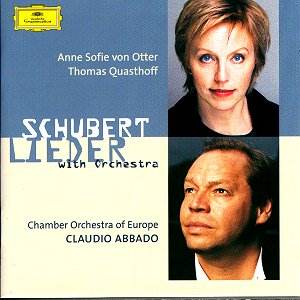This
is a fascinating endeavour. Orchestrations of Schubert songs by
a clutch of respected composers feature here (with one exception
– ‘Anon’ makes a token appearance in the arrangement of the ever-popular
An Sylvia: obviously a sensitive ‘anonymous’ here, producing
a stunningly harmless three minutes of string-dominated textures
which underpin Otter’s confident lyricism).
A
good idea to start with the only original item on the whole album,
too. The Romanze, D797/3b stems from the incidental
music to Rosamunde. Otter sets the tone by producing a
lovely legato, setting up our point of departure. In fact, the
first ten items are given to Otter, the ensuing nine to Quasthoff
(plus one encore each). The first arrangement comes from the pen
of Benjamin Britten, of one of the most popular songs, Die
Forelle. Britten had a great affection for Schubert, and a
great affinity to his music. He handles the song with great delicacy
and respect, but also with imagination and with consummate taste
(liquid clarinet figures implying piscine movement, for example).
This is pure delight, especially with the characterful clarinettist
of the COE in fine form.
Arrangements
by Johannes Brahms and Max Reger are featured in both singers’
selections. Brahms’ orchestral expansion of Ellens Zweiter
Gesang features the horn calls you can just imagine the fingers
of a Gerald Moore invoking so memorably at the keyboard (a strange
aural inversion here!). The effect is perhaps a little disconcerting,
to have the implicit rendered so expertly explicit, but it emerges
in the final analysis as a true meeting of minds. Max Reger, when
it comes to Schubert, is evidently of a more overtly Romantic
bent. Grethchen’s spinning wheel is string-based, with woodwind
doublings adding to the pathos and longing of the text. Perhaps
the effect is that bit too cushioned: the voice is carried along
on a cushion of sound, perhaps a trifle too comfortably. Abbado
moves the tempo on in an effort to heighten intensity as the imagined
kiss approaches at 1’50 and again at the kiss-fixated area around
3’00.
Perhaps
here is not the time or place for a further call for a reappraisal
of the talents of Max Reger, but the four arrangements sung by
von Otter provide an excuse. The orchestration of Im Abendrot
is (appropriately, given the title) positively glowing - the glow
of faith-suffused prayer; the words of Nacht und Träume
emerge on a bed of ululating sound; and, just to prove its not
all plain sailing, Gruppe aus dem Tartarus is a dramatic
reaction to the tortured souls of the text.
It
was, of course, too much to ask Berlioz to be self-effacing in
his single essay. Appropriately, it is the semi-drama Erlkönig
that comes in for ‘the treatment’. With its plaintive woodwind
comments (escapees from the Symphonie fantastique?) and
characteristically inflated aura it is guaranteed to raise knowing
smiles from the informed listener. Otter’s declamation of the
three voices (father, son and narrator) is expertly done without
over-exaggeration. A pity that the final two chords come across
as softened. In the piano original they can (and often do) emerge
as bleak terminators. Otter rounds off her group with the only
Liszt orchestration, that of Die junge Nonne. Ironically,
this is the weakest performance of her set. It is simply too smooth
(and this sounds more like Abbado’s doing than Liszt’s) and the
final ‘Alleluia’s need a rapt presentation that is outside of
the scope of the present performance.
Quasthoff’s
selection is if anything even more interesting. He includes a
clutch of items from the song-cycles (including Schwanengesang),
an area left untouched by Otter. Webern’s arrangements are elegant
and professional, tender curios of a composer not known for his
sentimentality. Tränenregen and Der Wegweiser
(from Die schöne Müllerin and Winterreise,
respectively) are delicacy in sound; Ihr Bild (Schwanengesang)
is remarkably lush. Only Du bist die Ruh’ begs a question
as to whether the layers of orchestration spread on a veneer of
sophistication unknown to Schubert’s original.
The
two Brahms arrangements are excellently done, particularly Memnon
(perhaps Am Schwager Kronos could have a more dramatic
accompaniment). More reverence to the Schubert/Reger An die
Musik would not have gone amiss either (it emerges as too
perfunctory here). Good to have an ‘alternative’ Erlkönig,
though - here it is Reger doing the honours. Quasthoff differentiates
the various characters’ voices better than von Otter, it has to
be said (he is very wheedling as the tempter at ‘Du liebes Kind,
komm geh mit mir!’, for example). The only fault comes at the
words ‘so brauch ich Gewalt’ (‘or I will need force’, 3’08) which
is not really menacing, despite the successful projection of intent
at the preceding, pederast-infused ‘Ich liebe dich, mich reizt
deine schöne Gestalt’ (‘I love you, your beauty allures me’).
Two
encores from Paris concerts conclude the disc, one for each singer.
Otter is characterful in Schubert/Brahms’ Geheimes, but
it is fitting that the enterprise closes, courtesy of Quasthoff,
with a curio. Offenbach’s realisation of Ständchen
from Schwanengesang is suffused with woodwind touches (over-highlighted
by the recording, however). And wait until the secret weapon arrives:
the (uncredited) Grimethorpe Colliery Band enters at 3’11(well,
that’s what it sounds like, anyway).
Fascinating
stuff, and a disc to return to many, many times.
Colin
Clarke

